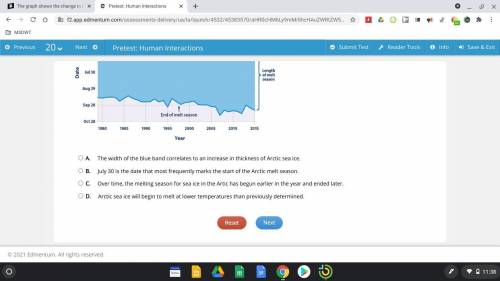
Geography, 28.06.2021 18:40 tiwaribianca475
The graph shows the change in the duration of the sea-ice melt season in the Arctic from 1980 to 2015. The blue band represents the time between when ice began to melt and when it froze each year. Which conclusion can you draw from the graph?
A.
The width of the blue band correlates to an increase in thickness of Arctic sea ice.
B.
July 30 is the date that most frequently marks the start of the Arctic melt season.
C.
Over time, the melting season for sea ice in the Artic has begun earlier in the year and ended later.
D.
Arctic sea ice will begin to melt at lower temperatures than previously determined.


Answers: 2
Another question on Geography

Geography, 22.06.2019 22:00
Give reason sugarcane waste can be recycled into useful products
Answers: 2

Geography, 23.06.2019 09:30
From the standpoint of geography,a is an internal rendering of an individual's known world
Answers: 3

Geography, 23.06.2019 16:10
Although china’s total economic output, measured by gross domestic product (gdp), is third largest in the world, it is considered a developing nation. what is most likely the most important factor for this designation? a. china’s government spends money on things that do not benefit human development. b. china has a large population, so its gdp per person is only modest. c. china has a strong economy but weak literacy and school attendance rates. d. china’s high rates of disease offset the country's economic gains.
Answers: 2

Geography, 23.06.2019 20:00
How will globalization most likely affect language around the world? no new languages will be created. nations will adopt a universal language. more languages will become extinct. english will become less prevalent. languages will grow more isolated and distinct.
Answers: 1
You know the right answer?
The graph shows the change in the duration of the sea-ice melt season in the Arctic from 1980 to 201...
Questions

Computers and Technology, 23.08.2019 02:30

History, 23.08.2019 02:30





Biology, 23.08.2019 02:30








Computers and Technology, 23.08.2019 02:30


Mathematics, 23.08.2019 02:30

Mathematics, 23.08.2019 02:30

Geography, 23.08.2019 02:30

Mathematics, 23.08.2019 02:30



